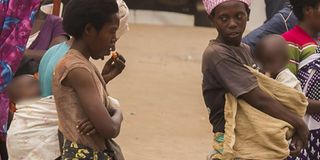Teen mums need ante-natal care to curb child mortality

What you need to know:
- Kenya has a neonatal mortality rate of 20 deaths per 1,000 live births according to Healthy Newborn Network.
- Leading causes of neonatal deaths include pre-term birth complications, intra-partum related events, sepsis/tetanus, congenital abnormalities, pneumonia among others.
- President Uhuru Kenyatta recently ordered that all pregnant schoolgirls be registered to ensure they access free pre and post-natal care.
- Data by the Kenya Health Information System shows that 152,820 adolescent girls aged between 10 and 19 have been impregnated.
- Anti-natal care helps the future mothers’ wellbeing, ensuring the safety of both the mother and baby at birth and thereafter.
- Girls could face challenges like not benefiting from the Linda Mama program since they do not have Identity Cards, which is a requirement.
Teenage pregnancy is on the rise in the country. It is a high-risk condition that leads to adverse perinatal and obstetric outcomes.
Kenya has a neonatal mortality rate of 20 deaths per 1,000 live births and 23 still births per 1,000 live births according to Healthy Newborn Network.
The network also indicates that about 193,000 babies are born prematurely annually and 13,300 children under-five die due to direct pre-term complications.
It gives leading causes of neonatal deaths as pre-term birth complications at 28 per cent, intra-partum related events at 29 per cent, sepsis/tetanus (16 per cent), congenital abnormalities (13 per cent) pneumonia (7per cent) and other conditions at 8 per cent.
The statistics show a drop in neonatal mortality since according to the 2014 Kenya Demographic Health Survey, neonatal mortality was put at 22 deaths per every 1,000 live births.
It is perhaps these shocking statistics that prompted President Uhuru Kenyatta to direct that all pregnant schoolgirls be registered to ensure they access free pre and post-natal care.
Education, Chief Administrative Secretary (CAS) Mr Zack Kinuthia confirmed that the order is contained in a presidential directive issued recently that also directed the National Crime Research Centre to come up with a report on high incidences of child abuse in the country.
The CAS said the President expressed worry that the social stigma most teen girls suffer once they conceive, could lead to many not getting maternal care, leading to birth-related complications.
Thousands of schoolgirls have become pregnant since schools were closed by the government in March to contain the spread of coronavirus.
ADOLESCENT GIRLS
Data released by the Kenya Health Information System shows that 152,820 adolescent girls aged between 10 and 19 have been impregnated.
Gladys Chania, a Child and Adult Psychologist notes that subjecting the expectant teenagers to neo and post-natal care is a move in the right direction.
Ms Chania told Nation that most neonatal deaths happen immediately after birth or at an early age due to infections, pneumonia or diarrhoea that is mostly caused by negligence or lack of capacity in infant rearing.
“Anti-natal care will help in the future mothers’ wellbeing being checked and monitored which will help in ensuring the safety of both the mother and baby at birth and thereafter,” said Ms Chania.
The psychologist added that education, given during the clinics, will enlighten the future mothers on how to take care of the pregnancy in order to give birth to a healthy baby.
“It will also help in walking a journey with these young mothers and curb a high degree of depression and lack of self-esteem related issues that lead to premature births,” she added.
Ms Chania noted that good care before birth will keep the mother and child healthy and enable the mother go back to school confidently thereafter.
She, however, noted that the girls could face a few challenges like not being able to benefit from the Linda Mama programme since they do not have Identity Cards which is a requirement.
Research conducted across nine counties by Plan International last showed that unintended teenage pregnancies were a huge issue for girls, significantly impacting their lives.
It further revealed that 98 per cent of pregnant girls were not in school, and 59 per cent of the pregnancies among girls aged 15-19 years were unintended.
RESCUE CENTRE
More than half (54 per cent) of sexually active adolescent girls in Kenya did not intend to get pregnant and have an unmet need for modern contraception.
The research also shows 45 per cent of severe abortion complications were also reported among adolescent girls.
Murang’a County has recorded a high number of teenage pregnancies, and the Woman Representative Sabina Chege, is leading efforts to establish a rescue centre for expectant teenage girls and those forced into early marriages.
Under the program, the girls will also be registered on NHIF Linda Mama programme to help them access pre- and ante-natal care.
Ms Chege is also seeking to engage Fida-Kenya to assist those with cases in court but without legal representation, to get justice.
The legislator has urged parents to protect their children from sexual predators. Parents, she said, should discourage their children from spending too much time on their mobile phones and ensure they check their social media forums and the friends they engage with.
Ahadi Kenya Trust founder Stanley Kamau, who has also been assisting pregnant teenage girls in Murang’a, called on the government to establish baby care centres to help expectant teenagers continue with their studies.
Speaking recently when he met over 20 expectant girls from Kandara Sub-county, Mr Kamau said the girls needed to be accommodated and encouraged.
“If we allow these children to drop out of school because pregnancies, we will have a bigger problem in the future,” he said.


